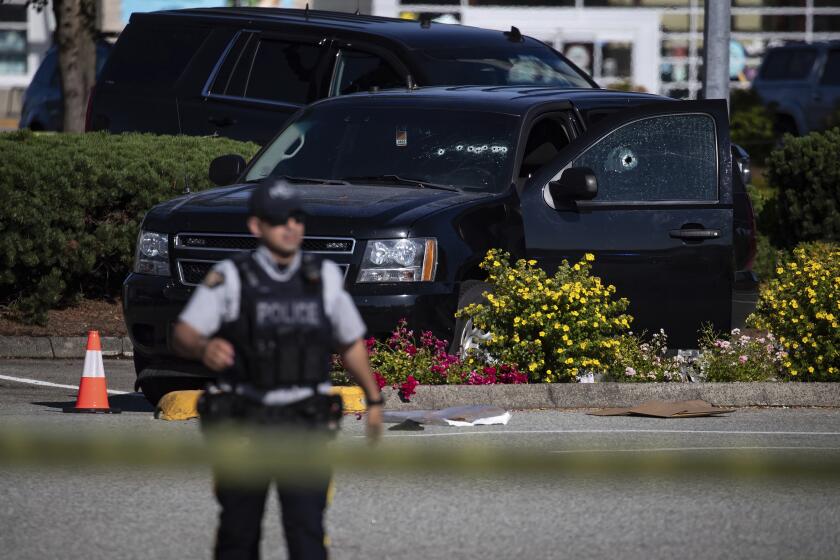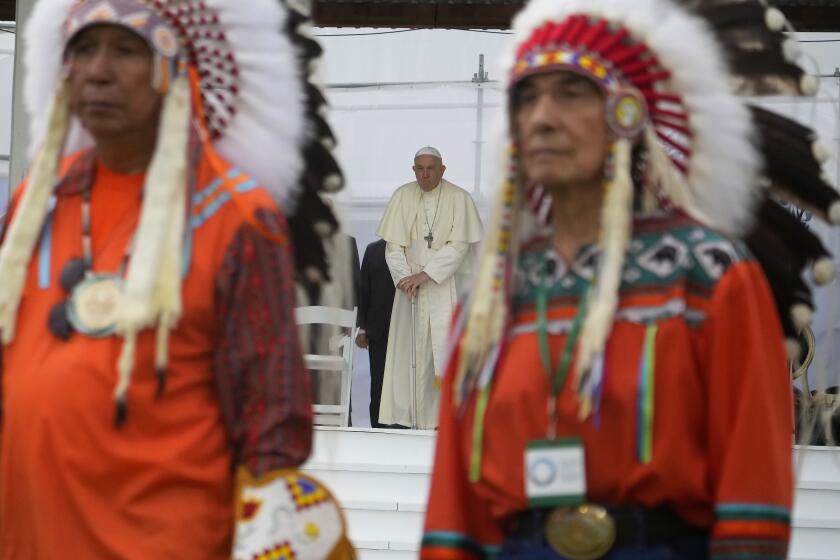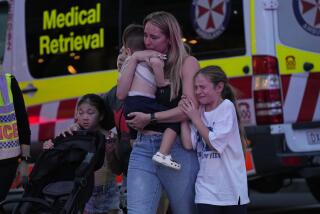Canadian police say one suspect in mass stabbings has been found dead
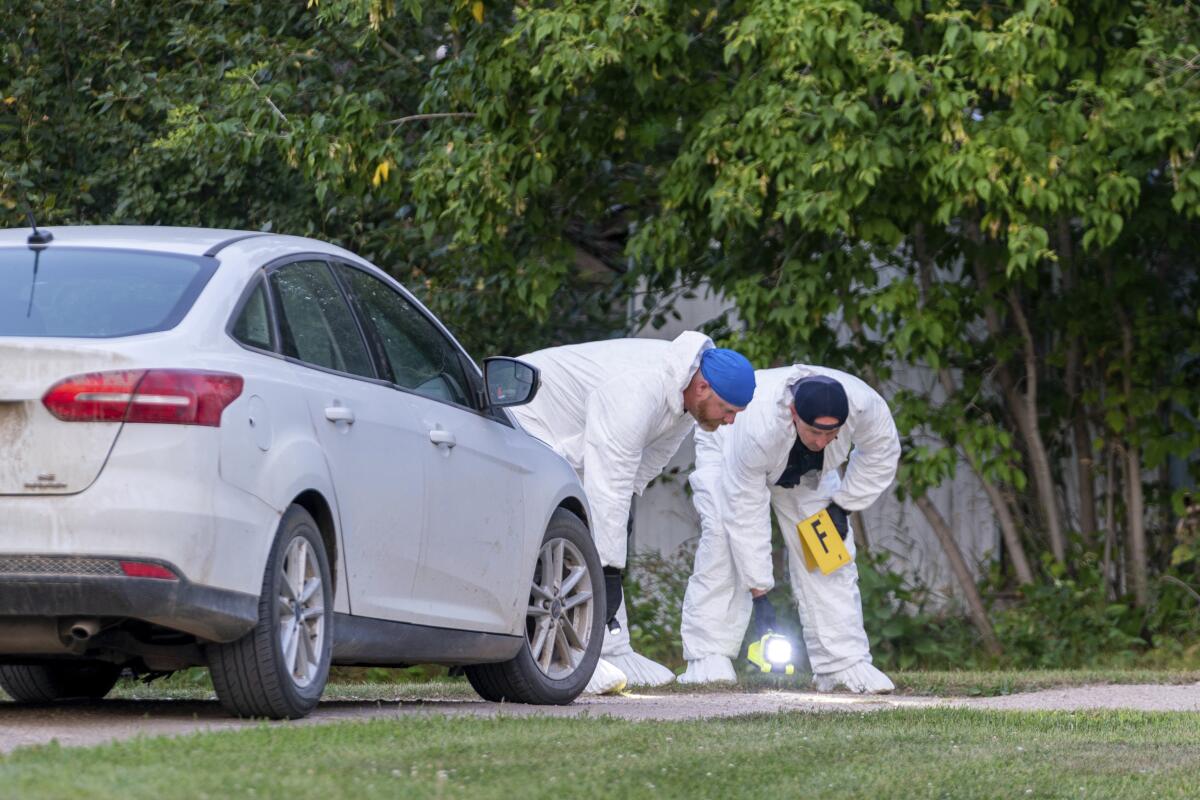
- Share via
REGINA, Canada — One of the suspects in the stabbing deaths of 10 people in the Canadian province of Saskatchewan has been found dead, and his injuries are not self-inflicted, police said Monday as they continued the search for a second suspect.
Regina Police Chief Evan Bray said Damien Sanderson, 31, was found dead and they believe his brother, Myles Sanderson, 30, is injured and on the run. Although Damien’s body was found near the stabbing sites, they believe Myles is in Regina, the capital of Saskatchewan.
“His body was located outdoors in a heavily grassed area in proximity to a house that was being examined. We can confirm he has visible injuries. These injuries are not believed to be self inflicted at this point,” said Royal Canadian Mounted Police Commanding Officer Assistant Commissioner Rhonda Blackmore.
The discovery of the body came on the second day of a massive manhunt for the pair, who are suspected of carrying out a series of stabbings in an Indigenous community and a nearby town, which also left 18 people injured. It was among the deadliest attacks in the nation’s history.
Authorities have said some of the victims were targeted and others appeared to have been chosen at random on the James Smith Cree Nation and in the town of Weldon in Saskatchewan. They have given no motive for the crimes — but a senior Indigenous leader suggested drugs were somehow involved.
Although they believe Myles Sanderson is in Regina, about 210 miles south of where the stabbings happened, authorities have issued alerts in Canada’s three vast prairie provinces — which also include Manitoba and Alberta — and contacted U.S. border officials.
With one suspect still at large, fear gripped communities in the rural, working-class area of Saskatchewan surrounded by farmland that were terrorized by the crimes. One witness who said he lost family members described seeing people with bloody wounds scattered throughout the Indigenous reserve.
Authorities say a man who targeted homeless people fatally shot two men in a Vancouver suburb before being shot and killed by police.
“No one in this town is ever going to sleep again. They’re going to be terrified to open their door,” said Ruby Works, who also lost someone close to her and is a resident of Weldon, which has a population of about 200 and is home to many retirees.
As the Labor Day holiday weekend drew to a close Monday, police urged Saskatchewan residents who were returning from trips away to look for suspicious activity around their homes before entering.
Arrest warrants had been issued for the pair of suspects and both men had faced at least one count each of murder and attempted murder. More charges were expected.
Police have given few details about the men. Last May, Saskatchewan Crime Stoppers issued a wanted list that included Myles Sanderson, writing that he was “unlawfully at large.”
While the manhunt continued, police also issued a provincewide alert for suspects in a shooting on the Witchekan Lake First Nation. Officials said the shooting was not believed to be connected to the stabbings, but such alerts are unusual and the fact that a second occurred while authorities were already scouring Saskatchewan for the stabbing suspects was notable.
The stabbing attack was among the deadliest mass killings in Canada, where such crimes are less common than in the United States. The deadliest gun rampage in Canadian history happened in 2020, when a man disguised as a police officer shot people in their homes and set fires across the province of Nova Scotia, killing 22 people. In 2019, a man used a van to kill 10 pedestrians in Toronto.
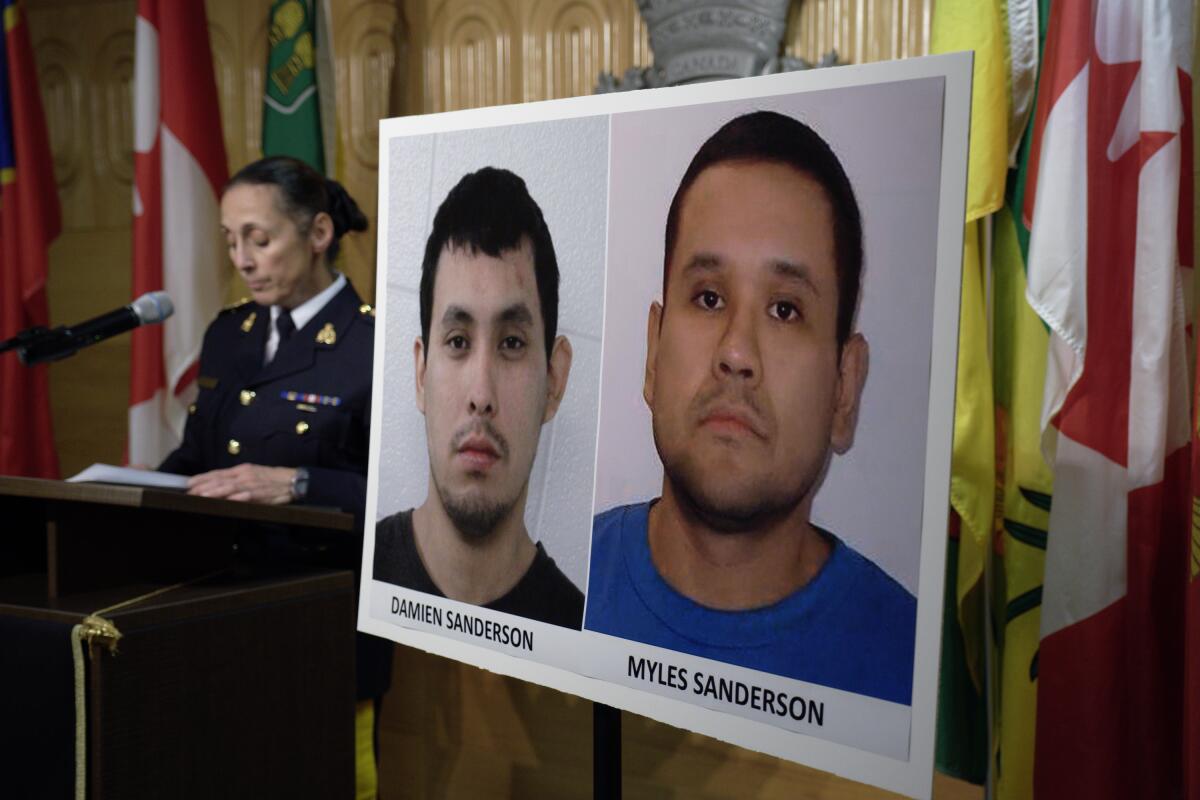
Deadly mass stabbings are rarer than mass shootings, but have happened around the world. In 2014, 29 people were slashed and stabbed to death at a train station in China’s southwestern city of Kunming. In 2016, a mass stabbing at a facility for the mentally disabled in Sagamihara, Japan, left 19 people dead. A year later, three men killed eight people in a vehicle and stabbing attack at London Bridge.
Canadian police got their first call about a stabbing at 5:40 a.m. on Sunday, and within minutes heard about several more. In all, dead or wounded people were found at 13 different locations on the sparsely populated reserve and in the town, Blackmore said. James Smith Cree Nation is about 20 miles from Weldon.
She couldn’t provide a motive, but the chief of the Federation of Sovereign Indigenous Nations suggested the stabbings could be drug-related.
“This is the destruction we face when harmful illegal drugs invade our communities, and we demand all authorities to take direction from the chiefs and councils and their membership to create safer and healthier communities for our people,” Chief Bobby Cameron said.
As the manhunt stretched on, Regina Police Chief Evan Bray urged anyone with information to come forward.
Canada arguably has the world’s most permissive euthanasia rules, but human rights advocates say those regulations devalue the lives of disabled people.
The elected leaders of the three communities that make up the James Smith Cree Nation declared a local state of emergency.
Chakastaypasin Chief Calvin Sanderson — who apparently is not related to the suspects — said everyone has been affected by the tragic events.
“They were our relatives, friends,” Sanderson said of the victims. “It’s pretty horrific.”
Among the 10 who were slain was Lana Head, a mother of two daughters.
“It’s sick how jail time, drugs and alcohol can destroy many lives,” Michael Brett Burns, Head’s former partner and the father of her daughters, told the Aboriginal Peoples Television Network. “I’m hurt for all this loss.”
Burns later posted on Facebook that there were dead and wounded people everywhere on the reserve, making it look like “a war zone.”
One person is dead and three others, including a woman from suburban Chicago, have been arrested after Canadian authorities foiled an alleged Valentine’s Day mass shooting plot in Nova Scotia, police said.
“The look in their eyes couldn’t express the pain and suffering for all those who were assaulted,” he posted.
Weldon residents have identified one of the dead as Wes Petterson, a retired widower who made coffee every morning at the senior center. He loved gardening, picking berries, canning and making jam and cakes, recalled William Works, 47, and his mother, Sharon Works, 64.
“He would give you the shirt off his back if he could,” William Works said, describing his neighbor as a “gentle old fellow” and “community first.”
Sharon Works was baffled: “I don’t understand why they would target someone like him anyway, because he was just a poor, helpless little man, 100 pounds soaking wet. And he could hardly breathe because he had asthma and emphysema and everybody cared about him because that’s the way he was. He cared about everybody else. And they cared about him.”
The pair said there is hardly any crime in the rural town, except an occasional speeding ticket. They always left the door unlocked until the night of the slayings.
“Not even when I go to town, I don’t lock my door,” Sharon Works said. “But now I have to find my key to my house. I never used to lock the doors and nobody around here until this happened.”
Pope Francis apologizes for the Catholic Church’s role in Canada’s policy of forced assimilation of Native peoples.
Prime Minister Justin Trudeau said the flag above Canada’s parliament building in Ottawa would be flown at half-staff to honor the victims.
“Sadly, over these past years, tragedies like these have become all too commonplace. Saskatchewanians and Canadians will do what we always do in times of difficulty and anguish, we will be there for each other,” Trudeau said.
More to Read
Sign up for Essential California
The most important California stories and recommendations in your inbox every morning.
You may occasionally receive promotional content from the Los Angeles Times.
